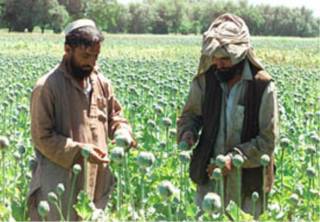Karzai Pledges to Target Drug Trade

Afghan Poppy Farmers

Karzai Pledges to Target Drug Trade
The newly elected Afghan president says smuggler terrorism is a top concern.
He will meet today with tribal and political leaders.
By Paul Watson, Times Staff Writer
KABUL, Afghanistan - After being sworn in as Afghanistan's first elected
president, Hamid Karzai vowed Tuesday to confront narcotics terrorists, who
have emerged as one of the greatest threats to the nation's new democracy.
Karzai told well-wishers at his inauguration, including Vice President Dick
Cheney, that his new government's top two priorities would be to expand
security and stability in the country and to work for "the destruction of
poppy cultivation, its smuggling and trading."
"We have now left a hard and dark past behind us, and today we are opening a
new chapter in our history," Karzai said.
"The war against terrorism has not finished yet," he said. "Even though
terrorists are not a very big, destructive danger for us, their drug
smuggling is what concerns us now in the region and in the world."
Afghanistan is the world's largest producer of opium, accounting for an
estimated three-quarters of the global supply. Afghan farmers have increased
their opium production by 64% this year, according to a United Nations
report, and much of it is processed into heroin.
The Taliban regime was close to eradicating opium farming before U.S.-led
forces overthrew the extremist mullahs in late 2001 for harboring the Al
Qaeda terrorist network. Several Afghan warlords who are U.S. allies, as
well as the Taliban, are now said to be profiting from the opium trade,
which is worth billions of dollars to Afghanistan's struggling economy.
Karzai was chosen interim president by a conference of Afghan leaders after
the Taliban's fall and sought to consolidate power by negotiating with
warlords who lead private militias.
"Various parts of Afghanistan have been captured by regional powerbrokers
who oppose reform," William Byrd, a senior World Bank economic advisor,
wrote in a September report. "Their operations are fueled by the opium trade
and bolstered by their ability to rule illegitimately by force, relatively
unchecked, outside Kabul."
The British government has led anti-drug efforts in Afghanistan, in part
because Europe is the main market for Afghan heroin. But as trafficking, and
its links with terrorism, has become a bigger threat to Afghan security, the
U.S. has begun to do more to combat it.
The U.S. Drug Enforcement Administration announced last month that it was
expanding its anti-narcotics operations in Afghanistan by permanently
stationing special agents and intelligence analysts here.
DEA teams will begin working with U.S. troops early next year to find and
disrupt drug networks. The agency said it had already helped seize 32,915
pounds of heroin on the shipment route through Central Asia to Europe in the
first nine months of this year.
About 350 political and tribal leaders from across Afghanistan have been
invited by Karzai's government to attend a two-day conference beginning
today on counter-narcotics efforts. The most complex, and potentially most
dangerous, stage of Afghanistan's transition lies ahead. Parliamentary
elections are scheduled for early April, and U.S. forces plan to step up
pressure through the winter on Taliban guerrillas and their allies, who
remain a potent force in large parts of eastern and southern Afghanistan.
Karzai's government has been quietly negotiating for months with people it
considers moderate Taliban leaders. U.S. Ambassador Zalmay Khalilzad
recently offered an amnesty to Taliban fighters who would agree to lay down
their weapons. The offer excluded between 50 and 100 leaders suspected of
crimes against humanity. A Taliban spokesman rejected the amnesty.
At a news conference with Cheney, the most senior American official to visit
Afghanistan since the Taliban's fall from power, Karzai said Afghanistan's
achievements had been possible only because of U.S. help.
"Without that help, Afghanistan would be in the hands of terrorists,
destroyed, poverty-stricken and without its children going to school or
getting an education," Karzai said.
-- ---------------------------------------
The Afghan economy depends in large part on the opium trade. What will the crops be replaced with in order to ensure that the farmers and their familis do not starve? I see this heading the way of Plan Colombia.....only much worse.
0 Comments:
Post a Comment
<< Home